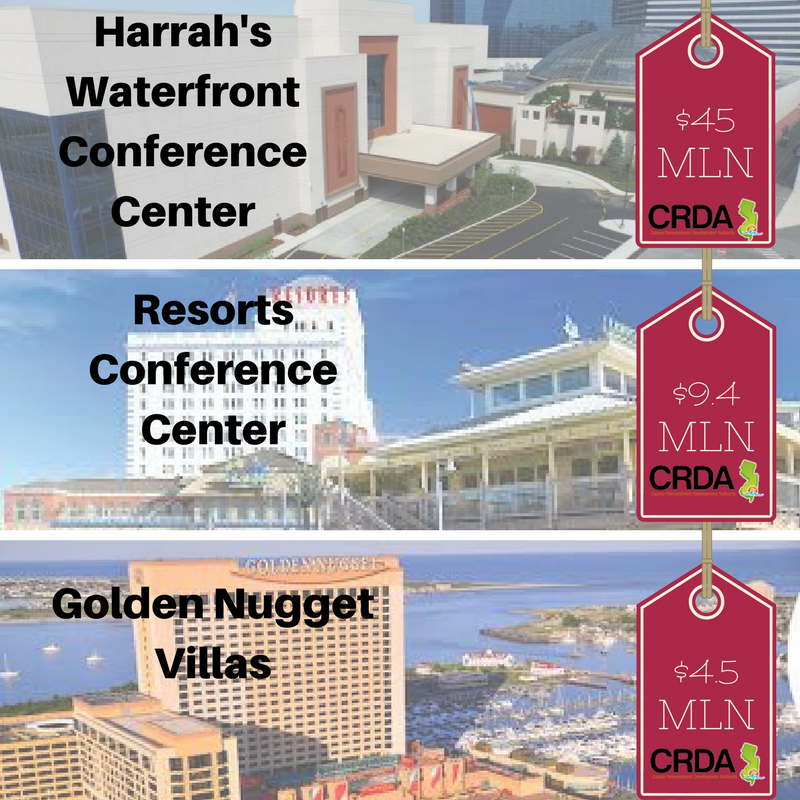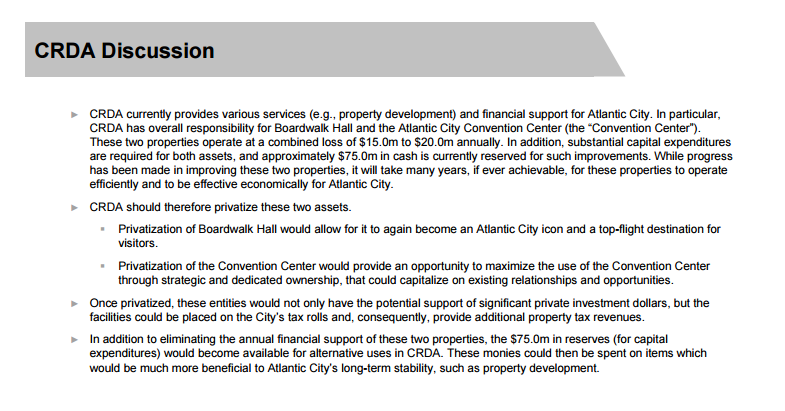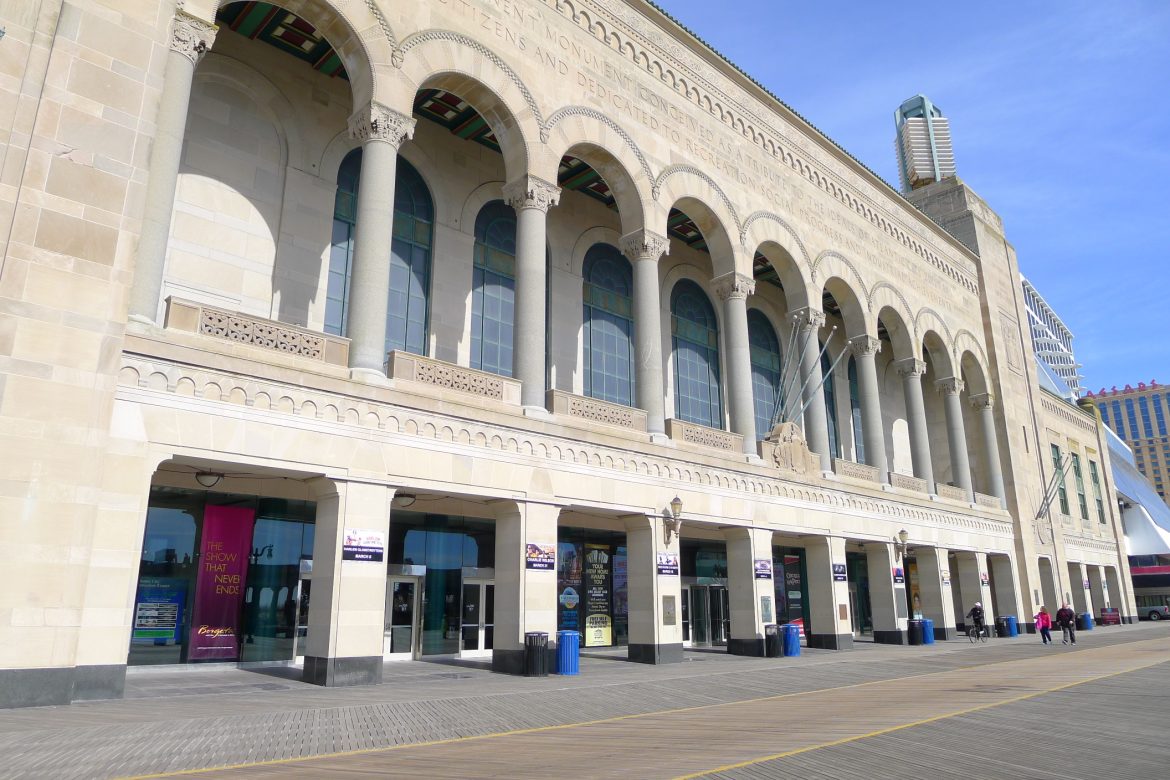Good news: Atlantic City attracted more visitors last year! Bad news: They mostly weren’t going to Boardwalk Hall or the Atlantic City Convention Center. Worse news: They mostly went to casinos in the Marina District! Where they’re isolated from the city!
Atlantic City, which is struggling to pay its bills after five casinos closed since 2014, was taken over by the state at the end of last year. The state is supposed to be helping the city increase its revenue and lower its costs. But a look at how the state has been running the Convention Center and Boardwalk Hall raises some questions about the state’s management skills.
To be sure, the Casino Reinvestment Development Authority’s Meet AC unit, which handles bookings for meetings, conventions and tradeshows in the city, brought in a record one million business visitors to the city last year. The problem is that fewer visitors went to Boardwalk Hall last year and fewer tradeshows or conventions were booked at the Convention Center. That matters because, since those properties are operated by CRDA, if they were performing well their revenue could be reinvested in the city. It also matters because those properties are in the center of the city and people there (rather than at the Marina District) are more likely to spend money at small businesses.
The reason why the Convention Center and Boardwalk Hall underperformed previous years is also interesting, since it had a lot to do with the casinos opening new spaces that took business from those two properties. And it was CRDA that funded the opening of those new spaces. A CRDA spokeswoman declined to comment about falling attendance at Boardwalk Hall or the drop in shows at the Convention Center, although she noted that more hotel guests anywhere in the city is a good thing, since they pay luxury taxes when they stay overnight or buy food and drink.
We thought it would be worthwhile to take a look at whether the state has managed Atlantic City’s show and convention business in the city’s best interests.
1. Like the city, the Convention Center and Boardwalk Hall spend more than they bring in
The state’s Department of Community Affairs decided to take over Atlantic City in November, because it thought it could do a better job than the city in trying to increase revenue and cut costs.
Problem is, the state has been running the Atlantic City Convention Center and Boardwalk Hall through the Casino Reinvestment Development Authority for a while now* and they both bring in less than they cost to run:

Data from the Casino Reinvestment Development Authority’s most-recent financial results here.
2. 2016 was a bonanza year for meetings in Atlantic City, but not for the public properties
You might remember the headlines at the start of the year: Meet AC Reports A Record Year. Well, that was true. But actually, it was a great year for the casinos and hotels, not so much for the Convention Center:

(Data from this CRDA page.)
Take a look at attendance figures for Boardwalk Hall and the Convention Center:

(Data from this CRDA page.)
CRDA spokeswoman Elaine Zamansky wrote in an email, “Boardwalk Hall is utilized primarily for entertainment events, not conferences. As the largest such space in the area, it is particularly suited to A-list entertainers, sports events and family-oriented events. The attractiveness of Boardwalk Hall is confirmed by its consistent annual ratings as one of the top venues of its size in the world:(http://www.boardwalkhall.com/news/detail/boardwalk-hall-receives-top-honors-from-industry-publications).”
3. The casinos had more space for conferences last year, thanks to state funding

CRDA – the same state authority that is charged with the finances of the Atlantic City Convention Center and Boardwalk Hall – helped fund conference space at Resorts, the Golden Nugget and Harrah’s that opened in the last two years. The Harrah’s Waterfront Conference Center, completed at the end of 2015, got a further $24.1 million in tax breaks over 20 years from the New Jersey Economic Development Authority.
Those facilities took some business away from the Convention Center, agreed Meet AC’s Vice President of Sales Gary Musich. But he added that, while it is true some business moved from the Convention Center to the Marina District in the last year, the Convention Center “still operates within single digits of its best year and worst year.”
Some smaller events moved for cost reasons, Musich said. “In Atlantic City where you didn’t have a lot of meeting space, you had a higher percentage of that business in the convention center, some of which was not sustainable at that cost,” he said. “Yes, our Convention Center business is down, because yes, it was really our only choice prior to this.”
CRDA spokeswoman Zamansky wrote in an email, “The new hotel conference centers have helped attract additional meetings that would otherwise not come to the City. That increases luxury tax revenues and helps the City as a whole. The Convention Center accommodates larger expos and events that the conference centers can’t.”
4. Where is the economic benefit of the casinos’ expansion in the city?
The money used by CRDA to fund those investments in conference facilities came from taxes paid by the casinos and earmarked for investment and community development in Atlantic City. (As a reminder, the city can’t pay its bills and homeowners are bearing about two thirds of the city’s property tax burden – in large part because of tax deals agreed between the state and the casinos.)
CRDA granted the casinos their own tax money to spend (it would be nice if homeowners could do that, right?) because they promised to do things like create jobs to staff the meeting centers. But while there was temporary construction work to build the facilities, the projects did not increase permanent employment.
Harrah’s $125.8-million Waterfront Conference Center opened in the second half of 2015. The casino’s parent, Caesar’s Entertainment, had filed for bankruptcy at the start of that year. The conference center was supposed to generate between 60 to 140 permanent jobs.
That didn’t happen. Harrah’s cut its payroll by 11 percent or 392 jobs in 2015 from the year earlier, according to annual filings with the Division of Gaming Enforcement. There were also no more jobs at Resorts, which cut staff by 3 percent or 64 jobs in 2015, the same year its conference facility opened.
Golden Nugget completed its ‘Villas’ meeting-space project last year and since casino employment data for 2016 is not published until April, it is not yet possible to see whether they kept this promise to CRDA:
5. Conferences are now moving to the Marina District
Another factor that limits any ‘trickle down’ effect from these expensive casino expansions is that a lot of the CRDA funding went to promote the conference facilities and other amenities (such as Borgata’s $15-million-CRDA-funded nightclub and seasonal pool) that draw visitors to the Marina District. There, delegates are far less likely to accidentally wander over to the boardwalk and buy a t-shirt, have their fortunes told or otherwise contribute to the local economy. Maybe that was by design, from the hotels’ point of view. But it is hard to see it as being the design of any city with full control over its own planning.
5. The state takeover officials are not addressing Convention Center, Boardwalk Hall costs
The state, in its 106 days in charge of Atlantic City, has done a few things:
- Raised property taxes for residents (to address revenue shortfall)
- Reached an agreement with the Borgata over tax appeals (addressing a liability issue)
- Tried to cut police and fire jobs (to address costs. But a fight with the firefighters’ union has now gone to court. Where it is adding to expenses.)
There has been no talk about privatizing Boardwalk Hall or the Convention Center, or even about altering the operating arrangements, even though that was the recommendation of the January 2016 state-commissioned report made by the city’s Emergency Manager.

6. Meet AC is not in favor of a tax that would help fund police and fire services
Even though having a safe city for visitors is a big selling point in the conventions and conferences business, Meet AC has not made any public comment against cutting police and fire jobs in the city. The board of trustees of Meet AC has, however, publicly said that a proposed additional $2 tax on hotel rooms that would help fund the police and fire departments if the cuts were to go through would make the city “non-competitive.”
7. The Convention Center and Boardwalk Hall are expensive
CRDA pays $180,000 a year, not including a separate marketing fund and performance guarantees, to Comcast Spectacor’s Spectra, which runs the Boardwalk Hall and the Convention Center. CRDA’s board earlier this week approved a contract to spend $2 million renovating two bathrooms at Boardwalk Hall that have been closed for decades – because the funds were available (through debt issued to restore the property** and backed by – yes – the luxury taxes paid by hotel visitors) even though a chunk of CRDA’s funding was last year transferred to the city.
Leaving aside skepticism about the questionable priority of a costly bathroom restoration in a city where almost 40 percent live at or below the poverty level and City Hall was recently selling old furniture to raise cash, Boardwalk Hall was opened in 1929. It’s a National Historic Landmark and it is expensive to maintain and run. Part of that has to do with the fact that, like the Convention Center (which was the most expensive public project ever built in Atlantic City) it is a state-run entity and any works project on the site must pay prevailing wages.
Meet AC’s Musich said that convention centers in general are expensive, because they are big buildings to maintain, and Atlantic City does not have a built-in base of corporations that might support the facility. Musich also said, “North East (convention centers) are particularly expensive, just because of the labor structure.” To mitigate high costs, Meet AC can “add value” by helping conference and event organizers with advertising and other marketing costs, he explained.
*The relationship between the state of New Jersey (through both CRDA and the New Jersey Sports and Exposition Authority), Spectacor and the Atlantic City Convention Center and Boardwalk Hall is a long and expensive story, littered with litigation, financial losses and debt. For background, I enjoyed reading the Third Circuit’s 2012 opinion in this tax case.
**The debt issued to restore Boardwalk Hall was also used to pay for a $60 million legal settlement in the above-mentioned case.

Overall, a very good analysis, especially the focus on why increasing business in the Marina District doesn’t seem to help the rest of the town. However, the first sentence claims that visitor numbers increased in 2016, which may not be true.. As the person who developed the methodology to determine annual visit trip numbers for AC starting in 1980, my preliminary analysis of yet incomplete 2016 data suggests the final number will be a very close call.
To summarize, my initial analysis of SJTA transportation data suggests the increase in traffic through the Pleasantville Plaza and on commercial flights were not enough to offset the decreases in rail, charter bus, and charter air passenger counts. But NJDOT pike numbers (if we ever get them!) might show an increase and if so visit-trips might have actually increased marginally in 2016.
Looking at other indicators, brick and mortar gaming win was down slightly, -0.3%, and final luxury tax and other revenue indicators are likely negative, except perhaps room revenue taxes. It looks like a close call on whether visit-trip numbers finally stopped hemorrhaging and perhaps even increased slightly.
Tony Marino
February 25, 2017
Thanks Tony – we wrote that business visitors increased, based on CRDA’s barometer data (linked to in the piece) for attendance at conventions, tradeshows and other shows. You make a good point about overall traffic into the city looking like a less clear case for an increase. Thanks for the comment – we should definitely try and get the turnpike data too…
There is a major problem with privatization of these buildings.
NO ONE WANTS TO BUY THEM!
Convention Hall is a nearly 100 year old National Historic Landmark. So not only do would any buyer have to make a profit in a town with other much newer (albeit smaller) venues, but also pay for nearly constant repairs. Also, selling the Hall to a private entity would put it at risk of being torn down despite of it’s landmark status.
Until the Convention Center can turn a profit, I doubt anyone would be interested in buying that either.